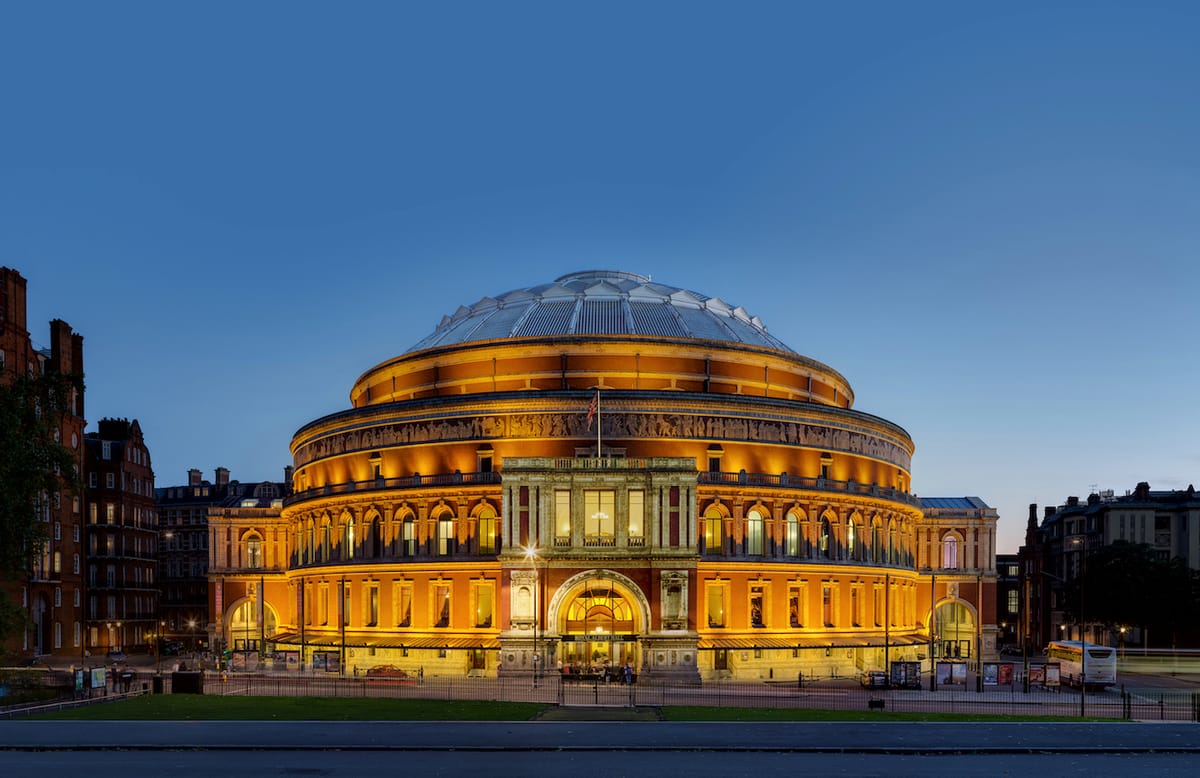The Performing Arts Dispatch: The Royal Albert Hall

From Saint-Saëns playing its Grand Organ within months of its opening to it being home to the BBC Proms, from its glazed iron roof to the mosaic frieze, the Royal Albert Hall is as iconic for its structure as it is for the formidable list of names that have performed within its arena over one and a half centuries. And it isn’t just music that has reverberated through it. The South Kensington concert hall hosted the first ever sci-fi convention in 1891, a costumed fundraiser themed on an 1871 science fiction novel. The world’s first bodybuilding contest was held here in 1901 as was the first British indoor marathon in 1909 and the first sumo tournament outside Japan in 1991. For the two ABBA performances that took place in the hall in 1977, there were 10,000 tickets available in total, and it received over 3.5 million postal applications.
These memories seem a tad distant under present circumstances – the Royal Albert Hall, like other performing arts centres across the UK and the world, closed its doors in March. Though the final two weeks of the Proms season will be performed at the venue, whether or not they will take place in the presence of a live audience remains to be seen. Chief Executive, Craig Hassall, tells us more.
ON Stage (OS): The Royal Albert Hall completes 150 years in 2021. How will the milestone be celebrated and have those plans been altered due to the pandemic?
Craig Hassall (CH): It will be a historic moment for the charity, but we haven’t yet announced how we will be celebrating – that announcement will likely come in the autumn. We do know that it will be a diverse celebration focused on both our history and our future, featuring a world-class line-up of artistes; new and innovative events; and larger education and outreach projects than we’ve ever done before.
In terms of the pandemic, we’ve lost £14m of income so far due to our extended closure, and have also had to reschedule a large number of shows, so we’ve taken the decision to extend the celebrations into 2022. The Hall’s very existence was thrown into jeopardy by the pandemic – but we’re doing everything in our power to make this upcoming anniversary one to remember.
OS: When the hall does open its doors to the audience, how do you envision the nature of concerts?
CH: This isn’t entirely clear yet, but it’s the question occupying us more than anything else at the moment. The most important thing is the safety of our audiences, artistes, staff and contractors, and we will rigorously follow the latest advice. Currently, it requires one-metre social distancing, but the Hall typically needs a capacity of around 80 per cent to break even. With this advice, the capacity would be around 36 per cent, which would make it financially unviable for us to stage live events.
The National Arenas Association, of which we are part, has been asking the government to look into the possibility of replacing blanket social distancing guidelines with other checks and balances. A test case in Seoul – where a Phantom of the Opera production has successfully continued running – has seen audience members walking through a light mist of disinfectant, having their temperature taken, and filling in a questionnaire about their symptoms and recent places they’ve visited. If we’re to find a solution, it is going to be a combination of numerous measures, from increased access points to hand sanitisers, Perspex screens and PPE for staff.
OS: How was the Royal Albert Home series organised?
CH: As soon as the Hall closed in March, we started thinking about ways to keep its spirit alive online. We wanted to entertain people who were forced to stay at home, but also to seize an opportunity for a new kind of digital reach, supporting artistes that might not normally be able to play at the Hall. It was also about raising awareness around the venue and ultimately taking in donations to help us through this period.
It’s almost entirely been original performances by artistes from their homes, but we’ve had some other presentations – including An Evening with Nitin Sawhney, who shared a whole variety of performances from home and the Hall. The mezzo-soprano, Katherine Jenkins, did a special behind-closed-doors concert from the venue itself, to mark VE Day.
OS: What were some of the key learnings during this period that will continue to guide the functioning of the venue when it reopens?
CH: To not be afraid to try new things, and to lead on them internationally – we were the first venue to run a series like Royal Albert Home. We learnt to innovate, embracing digital ways of sharing the Hall, and using the venue as a platform in music even without the building.
This period has also seen the Black Lives Matter movement spread throughout the world. We have taken some time to reflect and discuss how we can address systemic racism, and ensure we are putting in place meaningful actions that will ensure the Hall is fully open and welcoming for everyone, and address our own institutional issues.
This piece was originally published by the National Centre for the Performing Arts, Mumbai, in the August 2020 issue of ON Stage – their monthly arts magazine.






